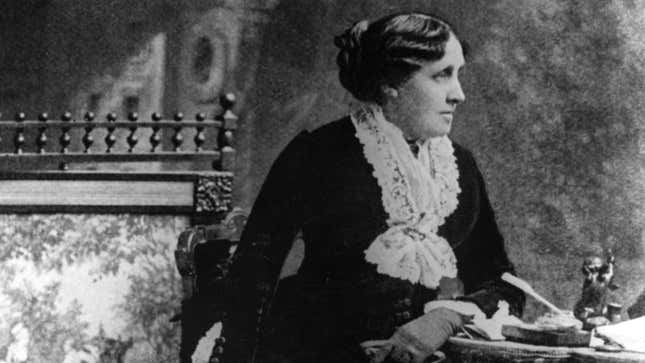Poor Louisa May Alcott Will Have Her Teenage Romance Writing Published
In Depth

Teaching writing to people in their late teens and early twenties is mostly just saying, “Write literally anything on the paper; it’s going to be bad” over and over again until the student writes a bad thing on the paper. Because that’s all being a writer is: writing things that suck, re-writing them, having them still suck, and then repeating the process until one finally produces a piece of writing that is not spiritually painful to read. What I did not tell the aspiring writers I taught for a decade was that if they worked very hard, got very lucky, and became famous, beloved authors, they were still going to die. And, should they become beloved dead writers, upon their deaths each and every embarrassing sentence they ever wrote while learning to write would be held up for all the world to examine.
That posthumous embarrassment has come for Little Women author Louisa May Alcott, whose draft of a romantic novella called Aunt Nellie’s Diary—written when she was as a teenager—is set to be published this month by a literary magazine called Strand. From the Los Angeles Times’s reporting, it sounds exactly like the rest of our teenaged novelistic endeavors:
“The 9,000-word fragment is narrated by the 40-year-old title character and follows her observations as a romantic triangle appears to unfold among her orphaned, fair-haired niece Annie Ellerton, Annie’s dark-haired friend Isabel Loving and the visiting Edward Clifford, “a tall, noble-looking” young man with a complicated past.”
Bless her heart. While editors of Strand say that the work is “complex,” confronting stereotypical gender expectations of the time period, it is still a teenager imagining a 40-year-old woman spying on a teenage love triangle and will most likely read like that. And while perhaps an interesting study of the work that helped hone her writing abilities, Aunt Nellies Diary is a reflection of what Alcott scholars call her “sentimental phase,” a nice way of saying she read a lot of Charles Dickens and Sir Walter Scott, then did that, but badly:
“You can see her picking up on some of the romanticized, even sensationalized material from those books. It’s a tough time for her, because the family was short of money, but it’s also a creative time. She’s beginning to develop and mature as a writer,” says Daniel Shealy, a professor of English at the University of North Carolina-Charlotte.
As someone who once spent hours copying Fiona Apple lyrics into a glittery notebook, let this blog serve as a legally binding statement that I would very much like for my death to be the last anyone ever hears of me. Should marked-up traces still exist somewhere in the recesses of my hoarded papers, that sloppily-drafted short story about the teenage girl plotting to bone her new youth pastor must be permitted to perish as well.